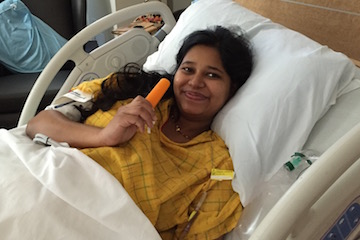Hungry during labor? Women may now get more than ice chips
February 23, 2016

“What? I can’t eat ANYTHING during labor? That’s just mean.”
For years, most health care practices have not allowed women to drink or eat anything but ice chips during labor. It’s not because we’re mean – there was a good medical reason for it. However, after advances in medical care and new research, some hospitals are changing their rules. For example, we just changed our policy at Clements University Hospital to allow clear liquids – things like clear juice, Popsicles, Jell-O and tea – beyond just water.
Healthy women with low-risk pregnancies should no longer need to fast during labor, according to a study by the American Society of Anesthesiologists in fall 2015. In fact, the researchers noted, a light meal actually may help women keep their energy up during childbirth. But before you order a double cheeseburger from the cafeteria, there are a few things about eating and drinking during labor that you should know.
Why was eating during labor banned in the past?
Doctors began requiring women to fast during labor after it was documented in the mid-20th century that pregnant women who were put under general anesthesia had an increased risk for aspiration. Aspiration occurs when food or liquid is inhaled into the lungs. It can cause a severe inflammatory reaction or death. It’s why you’re asked to fast before going in for surgery.
Pregnant women are at increased risk for aspiration for a couple reasons:
- The enlarged uterus puts upward pressure on the stomach.
- Progesterone – the hormone associated with pregnancy – is a muscle relaxant, which means the muscle at the bottom of the esophagus that acts as a barrier to keep the contents of the stomach from entering the windpipe and lungs is less likely to be snug and keep stomach contents in the stomach.
Obviously, we don’t want women to go through this, so it was decided that women should not eat or drink during labor. Ice chips were allowed because they would melt, but all other fluids would come through an IV.
But over the years, as women have expressed a desire to make labor more of a natural process, the health care community has been looking at whether this risk still applies today. It’s now more common for regional anesthesia – epidurals and spinal blocks – to be used. That’s one big change since fasting during labor was adopted.
As opposed to general anesthesia, which results in a complete loss of consciousness, regional anesthesia numbs only a part of the body and carries less of an aspiration risk.
Who may be able to eat during labor? And what?
Labor can be a long process and also is a lot of work! It would seem obvious that there would be benefits to replacing some of the calories you are burning, but teasing out that specific data in research has been difficult.
Some women may have no desire to eat during labor. Nausea and vomiting are common, in which case, food is the last thing on your mind. Others, especially those who are in labor for many hours eating nothing but ice chips, do get hungry.
If you are going in for a planned C-section, you will receive strict instructions not to eat or drink anything for a certain amount of time before the surgery. If you are at high risk for a C-section – you’re having multiples, you have health problems, or you have had a prior C-section – we may ask you not to eat or drink anything once labor has started.
For other women, depending on the physician and the hospital, the rules may be relaxed.
Talk to your physician about what they recommend you eat at home before coming to the hospital, and what they allow once you get there. Moderate amounts of liquid usually are fine, such as water, tea, black coffee, juice, carbonated beverages, or clear broths. We don’t want you to have a huge meal when you’re going into labor, but Jell-O, applesauce, Popsicles, or toast may be OK during early labor, while you’re still at home. In the rare event that aspiration occurs, solid foods can cause a worse reaction in the lungs when aspirated.
Questions to ask about eating and drinking during labor
Every hospital has a different policy on eating and drinking during labor. Ask about food and drink policies during your hospital tour or during a prenatal appointment with your Ob/Gyn. Discuss your C-section risk and how long you may be able to stay at home during labor, where you have more control over what you eat and drink.
An anesthesiologist may speak to your prenatal class, at which time you could also ask for their recommendations.
Finally, be honest. Tell your physician what you have eaten and when. If you’re not happy with your hospital’s policy, don’t try to get around it by sneaking food in. If something happens, it’s important for your obstetrician and anesthesiologist to know exactly what’s in your stomach.
We know you may be hungry, and we’re not trying to be mean – above all, we want to make sure that at the end of the day, you and your baby are healthy.
If you want more information about pregnancy, labor, and delivery, visit our Your Pregnancy Matters blog. We publish new stories every Tuesday.











